Why Neutrinos Are So Weird
Why Neutrinos are so Weird
If you held out your thumb, every second about 65 billion neutrinos will pass through it. Besides photons, neutrinos are the most abundant particle in the universe, and by far the most unique.
The existence of the neutrino was first theorized by Wolfgang Pauli, after noticing how energy didn’t seem to be conserved in beta decay. He believed that the missing energy was being carried away by some “invisible” particle. He would later say “I have done a terrible thing, I have postulated a particle that cannot be detected.”
Although elusive, neutrinos can be detected, but it requires sensitive, and often massive detectors. After finding that neutrinos came in three types: electron, muon, and tau, a problem seemed to emerge. Electron neutrinos are created all the time in the Sun, as a by-product of nuclear fusion, but they would always find only a third of the total number of electron neutrinos they were expecting. So, where did the missing neutrinos go?
It turns out, neutrinos actually oscillate back and forth between the three different types. So, by the time the neutrinos from the Sun had reached Earth, two thirds of them have turned into muon and tau neutrinos. This discovery was especially surprising, since everyone thought neutrinos had no mass, like the photon. The fact that neutrinos could change in-flight implied that they could experience time, and due to special relativity, this means they must have mass.
While that mystery has been solved, we still have plenty to learn from these strange particles. Exactly how much do they weigh? Although we know they must have mass, they are so light, we can’t tell how much. Since they have no electric charge, is a neutrino its own anti-particle? Is there more than just three types of neutrinos? Answering these could help us uncover some of the biggest mysteries in physics today.
More Posts from Astrotidbits-blog and Others










Cassini prepares for final orbital “Grand Finale” at Saturn.
Erik Wernquist, the same filmmaker who created 2014’s “Wanderers” and a stunning New Horizons promotional film in 2015, has created a new video highlighting NASA’s Cassini mission’s final days at Saturn. The Cassini spacecraft will begin its final series of orbits to cap a 13-year groundbreaking science mission known as the Grand Finale. For the first time ever in Cassini’s time at Saturn, the spacecraft will fly in between the planet’s rings and atmosphere. No spacecraft has ever before flown in this region of any of the solar system’s ringed planets. After 23 orbits, Cassini will dive into Saturn’s upper atmosphere September 15 where it will be destroyed. In 2008, mission managers explored a range of End of Mission scenarios that would protect Saturn’s moon’s from Earthly contaminants before ultimately deciding on atmospheric reentry. Cassini began her End of Mission manoeuvres on November 26, 2016, when it began the first of 20 ring-grazing orbits. A close flyby of Titan April 22 will alter the spacecraft’s trajectory to begin the first of 23 orbits in the Grand Finale, which will begin April 26.

Cassini launched from Earth on October 15, 1997, and entered Saturn orbit June 30, 2004. Six months later, on January 14, 2005, the European-built Huygens probe attached to the spacecraft landed on Titan, becoming the first probe to land in the outer solar system.
Originally scheduled for a four-year mission ending in 2008, Cassini received two mission extensions in 2008 and 2010, with the latter ending in 2017. With the spacecraft’s fuel reserves low, the Cassini team decided to end the mission. P/C: JPL/Erik Wernquist
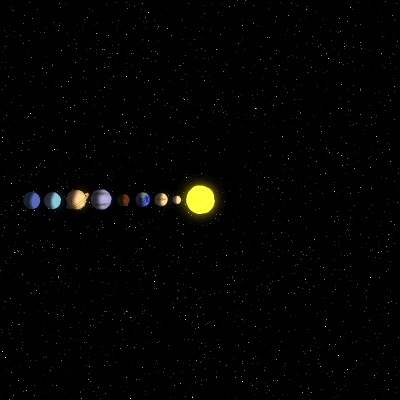
planets

The transit of Mercury, left, in front of the Sun, photographed from St.Petersburg, Russia on May 9th 2016. The photo was taken through a hydrogen-alpha (H-alpha) narrow spectrum solar telescope that permits examination of the sun’s protuberances and shows the surface activity. Credit: AP/Dmitri Lovetsky
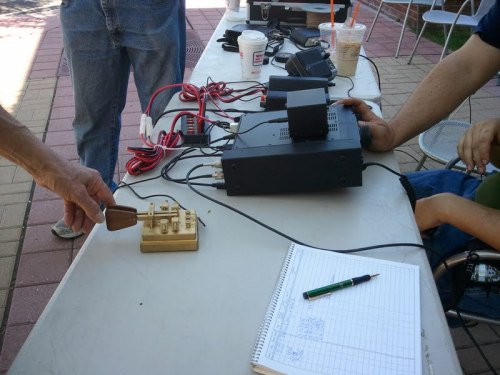
Just a typical Saturday in our courtyard calling Ohio using Morse code.
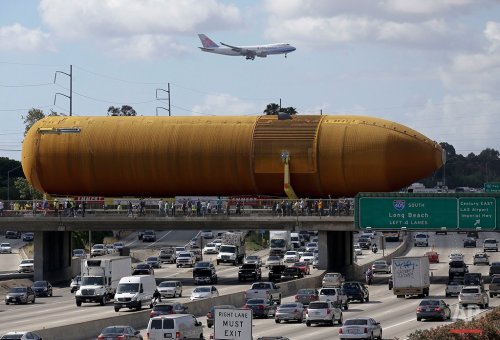
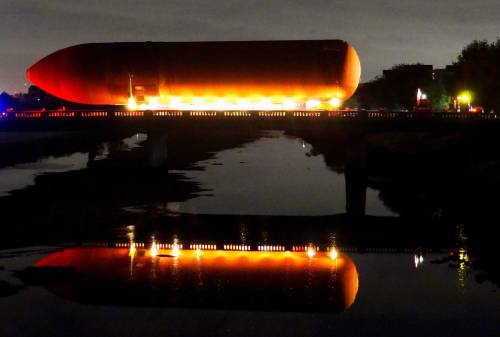

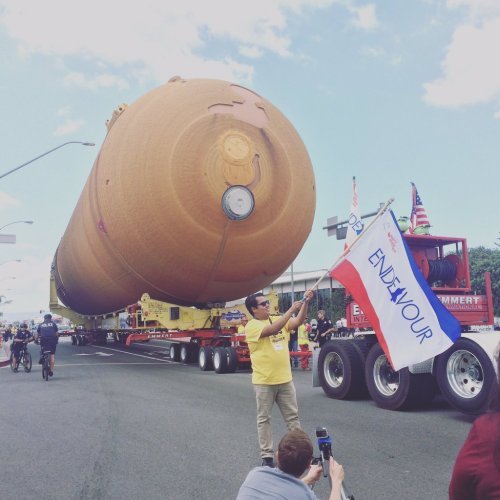
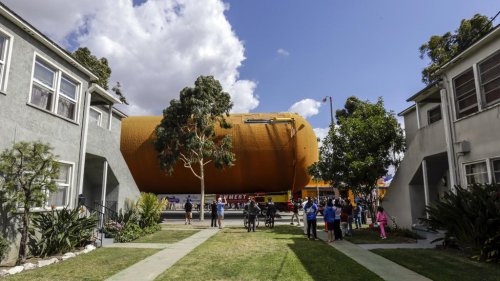
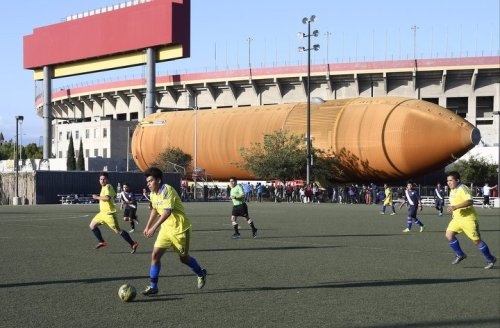
Last space shuttle External Tank arrives at California Science Center.
ET-94 paraded its way through the Los Angeles suburbs today, May 21, as it journeyed to its final home at the California Science Center.
The last surviving flight-worthy space shuttle external tank, ET-94 left the Michoud Assembly Facility in New Orleans April 12, where it has been since it was fabricated in the early 2000′s. It traversed the Panama Canal April 25-27, and arrived at Marina Del Rey in Los Angeles last Wednesday, May 19, after a 36-day sea voyage.
Leaving Marina Del Rey at 12:01am PDT with a New Orleans jazz band, the tank encountered more obstacles than expected during its 15.5 mile trek through the city, arriving at the CSC at 7:13pm PDT.
Towed through the streets of Inglewood, the last time space hardware shut down traffic was in October 2012, when space shuttle Endeavour was towed from Los Angeles International Airport to the CSC.
P/c: LA Times, California Science Center.
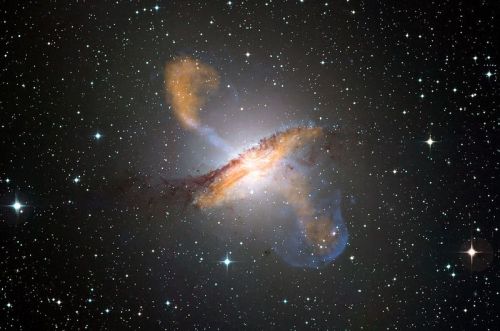
Lots of stuff like this at www.astrotidbits.com with explanations.
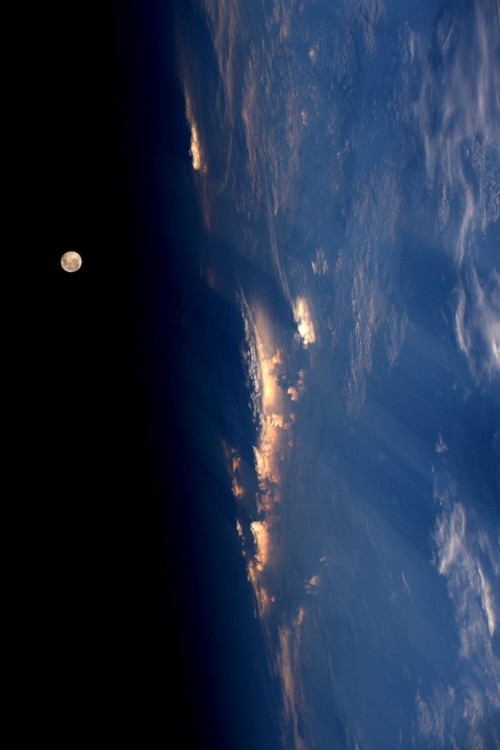
Space Station View of the Full Moon
Credit: NASA & ISS
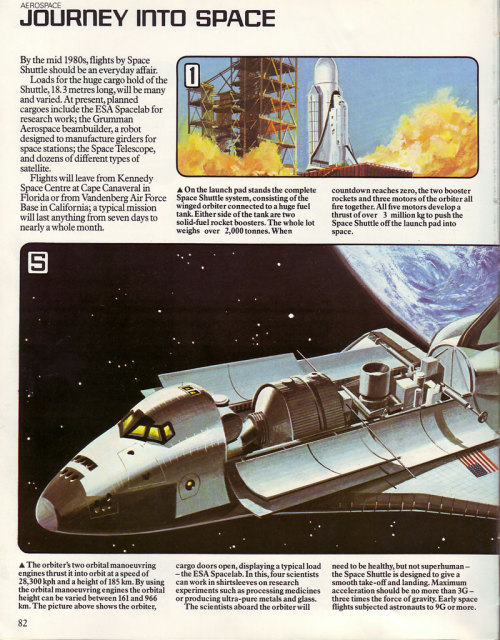
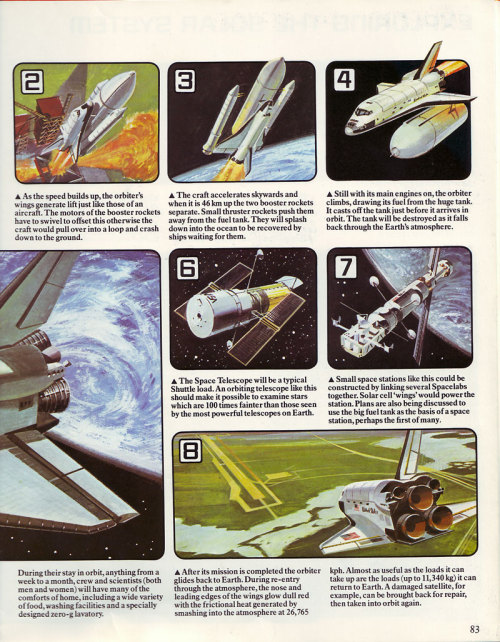
The Usborne Book of the Future
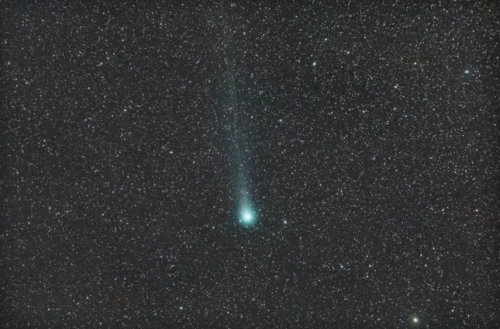
THIS COMET IS DRUNK
Comet Lovejoy is the first comet we’ve found that disperses ethyl alcohol into space, as much as would be in 500 bottles of wine every second.

-
 themightyif liked this · 1 year ago
themightyif liked this · 1 year ago -
 picknpaynoname liked this · 4 years ago
picknpaynoname liked this · 4 years ago -
 brittsphysnotes liked this · 4 years ago
brittsphysnotes liked this · 4 years ago -
 starxsally liked this · 4 years ago
starxsally liked this · 4 years ago -
 manic-depressive-bitch reblogged this · 4 years ago
manic-depressive-bitch reblogged this · 4 years ago -
 manic-depressive-bitch liked this · 4 years ago
manic-depressive-bitch liked this · 4 years ago -
 strangesuhi liked this · 4 years ago
strangesuhi liked this · 4 years ago -
 fantasticpeachdeputyknight liked this · 5 years ago
fantasticpeachdeputyknight liked this · 5 years ago -
 nusosdeldesti liked this · 5 years ago
nusosdeldesti liked this · 5 years ago -
 seesmuffin liked this · 5 years ago
seesmuffin liked this · 5 years ago -
 mythonik reblogged this · 5 years ago
mythonik reblogged this · 5 years ago -
 mythonik liked this · 5 years ago
mythonik liked this · 5 years ago -
 fartelf liked this · 5 years ago
fartelf liked this · 5 years ago -
 sciasian reblogged this · 5 years ago
sciasian reblogged this · 5 years ago -
 ardenigh liked this · 5 years ago
ardenigh liked this · 5 years ago -
 neutrilanino reblogged this · 5 years ago
neutrilanino reblogged this · 5 years ago -
 danitaharris liked this · 6 years ago
danitaharris liked this · 6 years ago -
 anntxns-blog liked this · 6 years ago
anntxns-blog liked this · 6 years ago -
 artistuck reblogged this · 6 years ago
artistuck reblogged this · 6 years ago -
 azufres reblogged this · 6 years ago
azufres reblogged this · 6 years ago -
 nerva-xe liked this · 6 years ago
nerva-xe liked this · 6 years ago -
 sunsetflowerblooming liked this · 6 years ago
sunsetflowerblooming liked this · 6 years ago -
 pandoricpony liked this · 6 years ago
pandoricpony liked this · 6 years ago -
 ha-bro-mania reblogged this · 6 years ago
ha-bro-mania reblogged this · 6 years ago -
 ha-bro-mania liked this · 6 years ago
ha-bro-mania liked this · 6 years ago -
 hollysadventuresinsleeping liked this · 6 years ago
hollysadventuresinsleeping liked this · 6 years ago -
 gralit-blog reblogged this · 6 years ago
gralit-blog reblogged this · 6 years ago -
 plushygun liked this · 6 years ago
plushygun liked this · 6 years ago -
 holladiewaldfe-blog liked this · 6 years ago
holladiewaldfe-blog liked this · 6 years ago -
 eupersephone liked this · 6 years ago
eupersephone liked this · 6 years ago -
 marshmallowwithabs reblogged this · 6 years ago
marshmallowwithabs reblogged this · 6 years ago -
 quantanaut reblogged this · 6 years ago
quantanaut reblogged this · 6 years ago -
 sideorderofentropy reblogged this · 6 years ago
sideorderofentropy reblogged this · 6 years ago -
 quantanaut reblogged this · 6 years ago
quantanaut reblogged this · 6 years ago -
 sideorderofentropy reblogged this · 6 years ago
sideorderofentropy reblogged this · 6 years ago -
 sideorderofentropy reblogged this · 6 years ago
sideorderofentropy reblogged this · 6 years ago